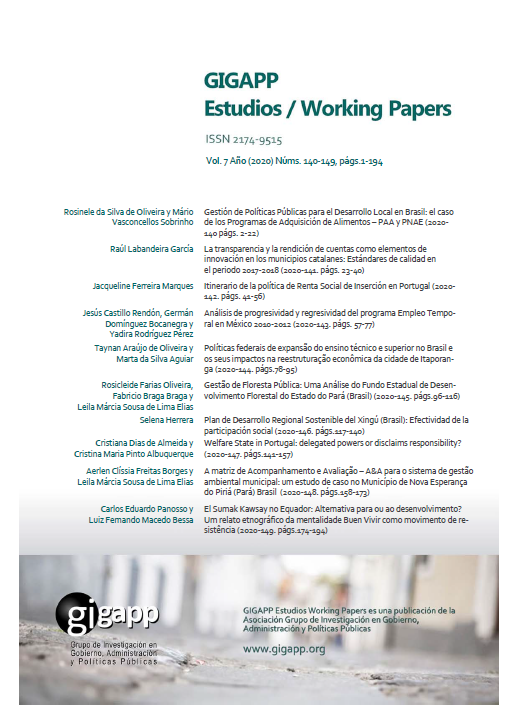Welfare State in Portugal: delegated powers or disclaims responsibility?
Resumen
La Red de Intervención Social Local (RLIS) salió a la luz en Portugal en 2013, como una política para reducir la pobreza y la exclusión social. En este contexto, ha sido posible observar una transferencia de responsabilidades dentro del alcance de la acción social del Estado para las Organizaciones de Economía Social con el pretexto de "responsabilidad social de los diferentes agentes sociales" (lógica de gobernanza de red) y la garantía de "Nuevas y mejores respuestas de proximidad a los ciudadanos". En este artículo, tenemos la intención de discutir críticamente los supuestos de la nueva lógica de la gobernanza de la red de políticas públicas, ejemplificada aquí por RLIS, y discutir los respectivos impactos, es decir, en términos de efectividad e innovación en el desarrollo local.
Descargas
Citas
Albuquerque, C.P., 2013. Acompanhamento social, capacitação e responsabilização. A subjetivação da intervenção social? in Serviço Social: Mutações e Desafios Atuais. Imprensa da Universidade de Coimbra, Coimbra, pp. 65–85.
Albuquerque, C.P., Amaro da Luz, H., 2016. Políticas sociais em Tempos de Crise. Perspetivas, tendências e questões críticas. Pactor - Edições de Ciências Sociais, Forenses e de Educação, Lisboa.
Branco, F., 2017. O Serviço Social como elemento substantivo de efectivação da Política Social. O Serviço Soc. Como Elem. Subst. Ef. Política Soc. 49–72.
Brandt, S., Roose, R., Verschelden, G., 2018. The professional repertoire of the social worker in times of workfare, in Book of Abstracts: Social Work and Solidarity in Search of New Paradigms. 16th Annual TISSA Conference 2018. Ljubljana (Slovenia).
Braun, K., Schultz, S., 2010. “... a certain amount of engineering involved”: Constructing the public in participatory governance arrangements. Public Underst. Sci. 19, 403–419. https://doi.org/10.1177/0963662509347814
Burgess, M.M., 2014. From “trust us” to participatory governance: Deliberative publics and science policy. Public Underst. Sci. 23, 48–52. https://doi.org/10.1177/0963662512472160
Ekundayo, W.J., 2017. Good Governance Theory and the Quest for Good Governance in Nigeria. Int. J. Humanit. Soc. Sci. 7, 154–161.
Estanque, E., 2012. O Estado social em causa: Instituições, políticas sociais e movimentos sociolaborais no contexto europeu. Finisterra - Rev. Reflex. E Crítica 39–80.
Farazmand, A., 2017. Governance Reforms: the Good, the Bad, and the Ugly; and the Sound: Examining the Past and Exploring the Future of Public Organizations. Public Organ. Rev. 17, 595–617. https://doi.org/10.1007/s11115-017-0398-y
Ferrão, J., 2015. Governança democrática metropolitana: como construir a “cidade dos cidadãos”? Desafios Metropolização Espaço 209–224.
Ferreira, S., 2008. A questão social e as alternativas da sociedade civil no contexto das novas formas de governação. Ciênc. Sociais Unisinos 44, 11.
Ferreira, S., Fernandes, M., Silva, B.C. da, 2013. Governação e Inovação Social. Presented at the IV Colóquio Internacional de Doutorandos/as do CES | “Coimbra C: Dialogar com os Tempos e os Lugares do(s) Mundo(s),” Coimbra, pp. 2–5.
Godinho, R., Henriques, J.M., 2013. Projeto Rede em Prática. Relatório final da avaliação do Programa Rede Social 2010-2012. IESE - Instituto de Estudos Sociais e Económicis.
Gosta, E.-A., 1993. Orçamentos e democracia: o Estado-Providência em Espanha e Portugal, 1960-1986. Análise Soc. 589–606.
Gundelach, B., Buser, P., Kübler, D., 2017. Deliberative democracy in local governance: the impact of institutional design on legitimacy. Local Gov. Stud. 43, 218–244. https://doi.org/10.1080/03003930.2016.1261699
Hespanha, P., 2008. Políticas Sociais: Novas Abordagens, Novos Desafios 21.
Hespanha, P., Carapinheiro, G., 2002. Risco Social e Incerteza: Pode o Estado Recuar Mais? Afrontamento.
Joaquim, C., 2015. Proteção social, terceiro setor e equipamentos sociais: Que modelo para Portugal?
Kessl, F., 2018. Social Work in the Shadow of the Welfare, in Book of Abstracts: Social Work and Solidarity in Search of New Paradigms. 16th Annual TISSA Conference 2018. Ljubljana (Slovenia).
Kim, S., Lee, J., 2012. E-Participation, transparency, and trust in local government. Public Adm. Rev. 72, 819–828. https://doi.org/10.1111/j.1540-6210.2012.02593.x
Lopes, M.C. do A., 2010. A avaliação no contexto da Governança.
Magone, J., 2017. A governança dos fundos de coesão em Portugal. Um caso de europeização superficial. Relações Int. 55–69. https://doi.org/10.23906/ri2017.53a05
Marques, T.S., Matos, F.L. de, 2016. Crisis and social vulnerability: a territorial reading, in Geography, landscape and risks: book tribute to Prof. António Pedrosa. Imprensa da Universidade de Coimbra, pp. 189–214. https://doi.org/10.14195/978-989-26-1233-1_9
Otto, H., 2018. Profession under attack - Contradictions of Social Work enmeshed in the service base welfare state, in Book of Abstracts: Social Work and Solidarity in Search of New Paradigms. 16th Annual TISSA Conference 2018. Ljubljana (Slovenia).
Pereira, M., Carranca, M.A., 2011. Coesão territorial e governança: abordagem multi-escalar, in Trunfos de Uma Geografia Activa: Desenvolvimento Local, Ambiente, Ordenamento e Tecnologia. Imprensa da Universidade de Coimbra, pp. 421–428. https://doi.org/10.14195/978-989-26-0244-8_46
Pereirinha, J. a, Carolo, D.F., 2009. A Construção Do Estado-Providência Em Portugal: Evolução Da Despesa Social De 1935 a 2003. Database 40–40.
Pereirinha, J.A.C., Daniel Ferando, 2006. Construção do Estado-providência em Portugal no período do Estado- Novo (1935- 1974): notas sobre a evolução da despesa social 1. Dados 17–18.
Portugal, S., 2008. As mulheres e a produção de bem-estar em Portugal. Ofiina CES 319, 40–40.
Ruggie, J.G., 2014. Global governance and “new governance theory”: Lessons from business and human rights. Glob. Gov. 20, 5–17.
Santos, B. de S. (org.), 2001. Globalização: Fatalidade ou Utopia? Edições Afrontamento, Porto.
Santos, B. de S. (org.), 1993. Portugal: Um Retrato Singular. Edições Afrontamento, Porto.
Santos, B. de S. (org.), 1991. State, Wage Relations and Social Welfare in the Semiperiphery: the Case of Portugal, Oficina do CES. Centro de Estudos Sociais, Coimbra.
Santos, B. de S. (org.), 1990. O Estado e a Sociedade em Portugal (1934-1989). Edições Afrontamento, Porto.
Santos, B. de S. (org.), 1987. O Estado, a Sociedade e as Politicas Sociais. O caso das políticas de saúde. Rev. Crítica Ciênc. Sociais 62.
Silva, F.C. da, 2013. Os portugueses e o Estado-Providência. Uma perspectiva comparada, in Atitudes Sociais Dos Portugueses. Imprensa de Ciências Sociais, Lisboa, p. 42.
Sposati, A., Rodrigues, F., 1995. Sociedade-Providência: Uma estratégia de regulação social. Rev. Crítica Ciênc. Sociais 28.
Varela, R., Guedes, R., 2013. Who pays for “wellbeing” in the welfare state in Portugal? Rev. Estud. Século XX 221–242. https://doi.org/10.14195/1647-8622_13_13
Veiga, J.F.F., Eliseu, M. de L., Cosinha, M.H., Fernandes, M.L., 2013. Debate sobre estratégias locais de desenvolvimento e modelos de governança. Monte - ACE - Desenvolvimento do Alentejo Central.
Vossole, J.V., 2013. A crise de legitimidade da governança climática global. Combinação de uma perspetiva marxista e polanyiana. Rev. Crítica Ciênc. Sociais 100, 153–176. https://doi.org/10.4000/rccs.5275.
Derechos de autor 2020 Cristiana Dias de Almeida, Cristina Maria Pinto Albuquerque (Autor/a)

Esta obra está bajo licencia internacional Creative Commons Reconocimiento-NoComercial-CompartirIgual 4.0.
Aquellos autores/as que tengan publicaciones con esta revista, aceptan los términos siguientes:
a. Los autores/as conservarán sus derechos de autor y garantizarán a la revista el derecho de primera publicación de su obra, el cuál estará simultáneamente sujeto a la Licencia de reconocimiento de Creative Commons Attribution-NonCommercial-ShareAlike 4.0 International (CC BY-NC-SA 4.0) que permite a terceros compartir la obra siempre que se indique su autor y su primera publicación esta revista.
Con esta licencia de acceso abierto, los lectores (usuarios) pueden:
- Compartir — copiar y redistribuir el material en cualquier medio o formato
- Adaptar — remezclar, transformar y construir a partir del material
Bajo los siguientes términos:
-
Atribución — usarios deberán dar crédito de manera adecuada, brindar un enlace a la licencia, e indicar si se han realizado cambios. Puede hacerlo en cualquier forma razonable, pero no de forma tal que sugiera que usted o su uso tienen el apoyo de la licenciante.
-
NoComercial — usuarios no puede hacer uso del material con propósitos comerciales.
-
CompartirIgual — Si remezcla, transforma o crea a partir del material, usuarios deben distribuir su contribución bajo la misma licencia del original.
-
Sin restricciones adicionales: los usuarios no pueden aplicar términos legales o medidas tecnológicas que restrinjan legalmente a otros de hacer cualquier cosa que permita la licencia.
b. Los autores/as podrán adoptar otros acuerdos de licencia no exclusiva de distribución de la versión de la obra publicada (p. ej.: depositarla en un archivo telemático institucional o publicarla en un volumen monográfico) siempre que se indique la publicación inicial en esta revista
c. Se permite y recomienda a los autores/as difundir su obra a través de Internet (p. ej.: en archivos telemáticos institucionales o en su página web) antes y durante el proceso de envío, lo cual puede producir intercambios interesantes y aumentar las citas de la obra publicada. (Véase El efecto del acceso abierto).



